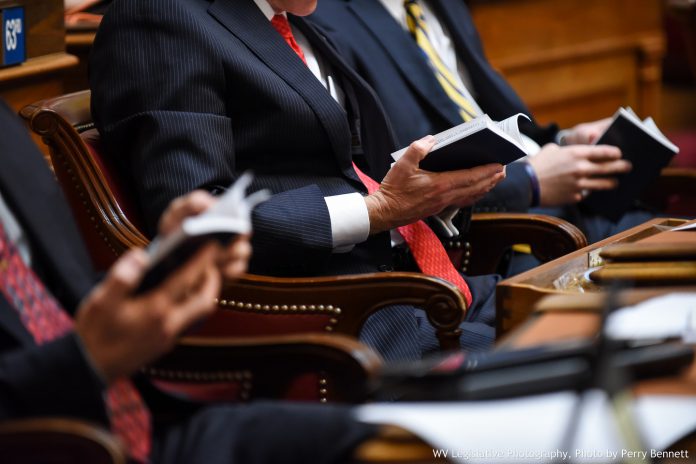On Feb. 14, the Governor signed into law the first bills of the 2008 Regular Session. These bills, like the vast majority of the bills the Legislature passes, made changes to the West Virginia Code, the organized, categorized collection of the state’s laws.
Ever since President Abraham Lincoln issued the proclamation that admitted the state of West Virginia into the Union, laws have governed the state, its wild and wonderful landscape and all its inhabitants. While the official law of the state is contained in the West Virginia Constitution and the Acts of the Legislature, the Code remains the quickest and most efficient legal resource for West Virginians.
Over the years, changing times have caused certain aspects of the Code to be molded according to a more modern society. These changes are brought about through legislative acts and are not intended to alter the original beliefs laid out in West Virginia’s Constitution. Instead, they allow the state to be more flexible to the needs of its people. As the state’s citizenry has increased, so has the necessity to create law more applicable to the people.
As West Virginia’s population has grown from approximately 18,500 in 1863 to over 1.8 million today, the expansion of the State Code was inevitable. Over the years, the Code has grown exponentially in scope and size. In 1884, the printed Code was a mere 910 pages, contained in a single volume. Now, the Code spans 29 volumes and thousands of pages. This current multi-volume Code reflects the state’s growth and the progress that the legislature has made to meet the constantly changing needs of West Virginians.
One result of its burgeoning size is that several obsolete or obscure laws remain in the Code. One such law prohibits a person from wearing a hat or head covering that blocks the view of others in a theater where an admission fee is charged — a misdemeanor offense, with a fine of $2 – $10. Another allows court judges to fine people who curse in public or are publicly intoxicated $1 for each offense. In addition, a law dating back to 1919 attempts to thwart rebellious individuals — making it unlawful to display or possess a red or black flag that indicates support of ideals or institutions that are antagonistic to the Constitution and Laws of West Virginia and the United States.
Dueling was once a common practice early in our nation’s history. It is now illegal but remnants of this extinct practice can still be found in State Code. Mocking or taunting a person for refusing to participate in a duel is still a misdemeanor offense, punishable by up to six months in jail and a fine of $100. Also, a person convicted of participating in a duel cannot hold public office.
These laws are often removed or altered to make them more relevant and while they are still on the books, they rarely are, if ever, applied today. Although these laws are no longer needed in today’s society, they remain a part of the current West Virginia Code and reveal some interesting aspects of our state’s history.
In certain instances, the Code must be changed to meet the demands of a changing society and its beliefs. During the period of Prohibition, 1920 to 1933, state and federal laws eliminating the sale and possession of alcohol were passed. In 1923, beer, wine and liquor were banned in the State Code. Only intoxicating drinks produced before July 1, 1914, and stored according to federal guidelines were allowed to be sold. Manufacturing, selling or storing contraband beverages in West Virginia was a misdemeanor, subject to a $100 to $500 fine and a two to six month jail sentence. A second offense was considered a felony, punishable by one to five years in prison.
In 1935, two years after the end of Prohibition, the Legislature passed House Bill 119, and amended the State Code once again. The bill, which allowed the sale and possession of alcoholic beverages, was enacted into law and became Chapter 60 of the West Virginia State Code. This bill established the West Virginia Liquor Control Commission, and charged them with regulating the sale of alcohol at the retail and wholesale levels. Also, the term intoxicating liquors was further defined and divided into beer, alcohol, non-intoxicating beer, wine and spirits. This amendment is representative of how the Code has changed in order to stay aligned with federal laws and the nation’s culture.
As West Virginia has progressed, so has state law. The West Virginia Codes of 1868 and 1923 provided a foundation for the current state Code, which has been in effect since 1931. As bills are passed, it is amended annually and will continue to be modified without compromising its original integrity to meet West Virginia’s evolving society.
Today, citizens can view the Code in printed form at their local library or county courthouse. The Legislature’s Web site provides the easiest and most immediate way to access the complete West Virginia Code. Please visit us at: www.wvlegislature.gov

